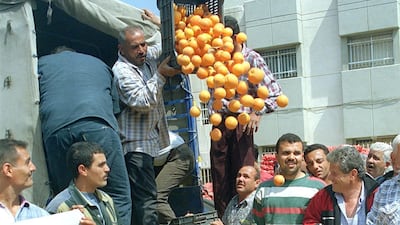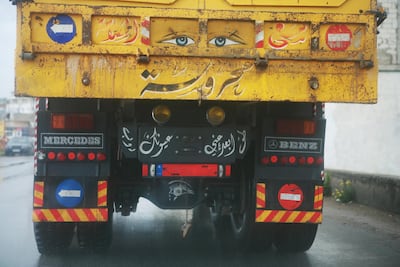In north Lebanon’s impoverished agricultural province of Akkar, there are two popular options for those who can’t make a living in the fields: sign up to the military or turn to smuggling.
The remote region rarely gets visitors, but it is a major conduit for the brightly coloured hand-painted trucks to ply the routes smuggling Syrian goods across the border.
Despite the ongoing civil war across in Syria, the trade is alive and well. Tonnes of vegetables enter Lebanon illegally every month. At this time of year, they mostly carry tomatoes.
This has angered local farmers for years. They say that it drives prices down in Lebanon and hurts their business.
In recent years, farmers have staged protests and dumped their unsold produce on major roads, but the government has taken little action.
But since October 17 and the start of nationwide protests demanding accountability from Lebanon’s leaders, local residents in Akkar have started taking matters into their own hands and are openly defying authorities in a way that few dared to before.
Joined by activists, over the last month they have stopped scores of trucks and those found not to have the right permits were forced turn their cargo over to the Lebanese police and return to Syria empty-handed.
Worried about accusations they have physically assaulted drivers, mostly Lebanese or Syrian nationals whom the residents say are not responsible for the smuggling, they have filmed their actions and posted them online.
They explain that they check to see if drivers have a customs receipt for their cargo and if that receipt matches the listed type and quantity of fruits and vegetables aboard. But the whole process, they say, remains peaceful.
Ahmad Al Boustany, 44 is one of the most active members of Akkar’s vigilante groups. His actions have drawn the ire of those behind the smuggling networks, who he says have sent him death threats.
"They ask me why I am doing the work of the state. I told them if the state is corrupt, honest people are the ones who must fight corruption," he told The National as he sat in his home on a cold winter's day last week.
In late January, he recounted that as was driving with a friend following in another vehicle behind when three jeeps drove up close and threatened him with a gun before smashing one of his cars’ windows.
“Smugglers take the main roads with their trucks. They don’t worry about anything. We see customs employees who are paid low salaries [but] buy houses and cars for every person in their family. They receive hundreds of dollars for each truck,” he said.
Mr Al Boustany, a schoolteacher in the small town of Bebnine, might not be a farmer, but he feels concerned by the sheer scale of the fruit and vegetable trade that crosses into Lebanon illegally through the nearby border crossing of Arida. It affects all of Lebanon, not just his region, he says.
“We have to get rid of corruption to build a state, right?” said Mr Al Boustany, who phrases most of his sentences like questions, as if trying to keep the attention of his rowdy class. “The state cannot build roads or schools for us if it doesn’t receive any money, right?”
Mr Boustany and other activists who support him say that they feel emboldened by the unprecedented near-five-month protest movement. One of its core demands has been to end corruption.
While many have focused on millions of unaccounted-for spending by the state or the public contracts passed to politicians and their friends, for those in Akkar, ending corruption filters right down.
Like many locals The National spoke to, Mr Al Boustany believes that the only reason that the smuggling happens so easily is that customs officials are corrupted by smugglers who pay them to not inspect their trucks. The claims, while widely held by locals, are hard to prove with officials reluctant to talk about the matter.
But Antoine Howayek, the head of the Lebanese Farmer’s Association, says, “this kind of smuggling has been ongoing for decades.”
“It’s controlled by a mafia on both sides of the border that nobody can stop. Even when there was an agreement allowing Syrian fruit and vegetables to enter Lebanon without taxes, there were still smuggled goods because they wanted to avoid the paperwork,” he said.
The agreement he was referring to started in 2000 but ended with the start of the Syrian war in 2011.
Farmers say the smuggled Syrian fruit and vegetables in Lebanon forces them to discount their crops, hurting their businesses that have already suffered from years of war in Syria, which cut their main export routes to Iraq, Jordan and the Gulf.
Today, at least 65 per cent of the tomatoes sold in Lebanon are smuggled in, claimed Mr Howayek.
Syrian fruit and vegetables are cheaper to produce than in Lebanon, where poor state infrastructure drives production costs up and costs of living are comparatively higher.
Omar Saufan, head of the Association of greenhouse farmers in Akkar and Minieh, said that in winter, smuggled tomatoes from Syria cost between 800 and 1,000 Lebanese pounds, roughly 10 per cent less than Lebanese produced tomatoes.
While he did not personally participate in stopping smuggling trucks, he described the initiative as “very positive.”
“It sheds light on a stronghold of corruption,” he said. “Our sector has all but collapsed. Farmers can barely afford to spend money on basics such as fuel, fertiliser, and the plastic sheets for greenhouses.”
Mr Howayek also hailed the actions of Akkar residents.
“What they do is very good,” he said. “It’s the only way to control what comes through. The employees of the Agriculture Ministry are so corrupt that it’s impossible to do anything with them,” he said.
At border checks, Agriculture Ministry inspectors look at trucks entering Lebanon alongside customs officials.
Louis Lahoud, the director general of the ministry, did not respond to a request for comment.
Bassam Sarkis, the head of the customs office in the northern coastal border town of Arida, declined to comment when asked about the vigilante anti-smuggling activists. Media questions, he said, should be directed to the central office in Beirut. Despite numerous attempts, director general of the Lebanese Customs Administration, Badri Daher, did not respond.
In early November, a Lebanese financial prosecutor filed charges against Mr Daher for squandering public funds. He said the charges were unjustified and sued a Lebanese journalist for defamation following reporting that, in part, sparked the charges.
Despite many promises of action, the Lebanese authorities have found no effective way to counter smuggling.
In 2016, then Agriculture Minister Akram Chehayeb attempted to ban Syrian fruit and vegetable trucks from entering Lebanon altogether. But he had to backtrack a few months later when Syria threatened to stop importing Lebanon’s bananas, one of its most important fruit crops, said Mr Howayek.
Mr Al Boustany is just one of the hundreds of vigilantes. Together, they occupied the customs office of Arida on January 22 and have also targeted the office of local governor Imad Labaki in the town of Halba.
Almost every morning, they block the entrances of state institutions for several hours, inspect offices and broadcast their blockades live on Facebook.
There have been some small victories.
They said inspections by customs officials in Akkar have increased recently, with news reports about a raid on a warehouse stocking thousands of smuggled eggs on January 31.
Mr Al Boustany believes they were conducted because of the protests, but he complains they are just for show and are limited in their scope. “They inspect maybe 20 per cent of what should be inspected,” he said.
The vigilantes know they face a daunting task. Smuggling has always been a part of local peoples’ lives in the region and has rarely been questioned.
As the son of a fisherman, Mr Al Boustany remembers how, as a child, the Syrian authorities who occupied Lebanon from 1976 to 2005 banned fishing on certain days to make way for Lebanese boats smuggling illegal goods to Syria, such as televisions.
Corruption has become part and parcel of the Lebanese sectarian power sharing system, as sectarian leaders seek to give government jobs, funds and contracts to members of their religious community to win support.
Lebanon ranks 138th out of 180 countries in Transparency International's latest corruption perception index.
In a speech last November, President Michel Aoun recognised this fact, saying that “sectarian red lines” prevented him tackling the issue.
“That is why I turn to you, oh Lebanese people, asking for your help," he said.
Despite the president’s unpopularity among protesters, people unwittingly took his words literally in Akkar, where the movement has persisted more strongly than in other areas of the country.
Unlike much of Lebanon, old allegiances between people and sectarian leaders were worn thin even before the latest uprising. Locals say they had little to lose after years of neglect and embraced the uprising, often travelling hours by bus to Beirut to join the marches in the capital.
Every day, activists meet at a makeshift tent in the centre of Halba, staying warm around a wood fire periodically topped up with gasoline to keep the damp wood burning.
Like other protesters in the country, they call themselves “revolutionaries”. Many are unemployed. Demanding accountability from the state has given them a new sense of purpose and cut through sectarian lines.
“We are united now. The revolution broke walls between sects and regions,” said Firas Abdallah, 36, a filmmaker from Halba.
“The revolution is not just about stopping trucks. People die here from lack of medical care,” complained Abdel Rahman Zakarieh, 28 and unemployed. He speaks loudly and makes funny faces, causing laughter in the assembled group. Early January, he became an online sensation in Lebanon. A video of him climbing onto a car and belly-flopping onto a crowd fighting with police outside a bank because of cash withdrawal limits went viral.
Suddenly serious he pulls up a picture on his phone of an old woman crying while she begs on the street.
“We have nothing, no social security, no work,” he says. Then he swipes right and a picture of him walking a white donkey appears.
“When the price of fuel gets too expensive, I’ll ride my donkey,” he laughed.










































